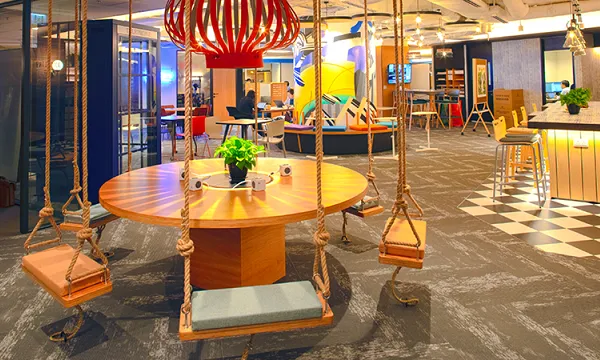
How bosses are rethinking worker wellness
Tobacco giant Philip Morris International offers a tailored employee wellness plan.
With a survey from UBS revealing that more than six in 10 employees in Hong Kong are unhappy at work and half are intending to switch jobs, it is no surprise that employers are rethinking working conditions and perks to retain staff. And with employees in Hong Kong working an additional 24 hours during the week thanks to a prevalent issue of presenteeism, as found in a study by Maxis Global Benefits Network, many of the country’s businesses are designing office spaces and employee benefits with worker wellness in mind.
Human resources consulting firm Robert Half Hong Kong introduced its own wellness programme under the platform “It’s Time We All Work Happy” in 2018, which comprises five key initiatives touching on health and physical wellbeing, flexible work arrangements, and social responsibility. “This includes the provision of a weekly personal trainer for group staff workouts, discounted health club memberships, the option to leave work at 4 p.m. on Fridays, a monthly allotment of time to enjoy lunch with your family, free health checks and quarterly charitable initiatives,” Elaine Lam, associate director for Robert Half Hong Kong told Hong Kong Business.
Meanwhile, tobacco giant Philip Morris International (PMI) has tailored a wellness plan that features flexible working hours, non-fixed lunch hours wherein employees are able to take a lunch break anytime between 12 to 2 p.m., mobile devices and laptops to work from home, share job arrangements and half-day work arrangements, according to Chris Sung, senior consultant at Michael Page Hong Kong. At PMI, the HR department conducts focus groups to discuss wellness trends and creative ideas, allowing employees to vote for different wellness options.
Besides incorporating a wellness room and posting curated artwork, property consulting firm Colliers International has gone as far as renovating its Hong Kong office to change up its acoustics, filtered water and lighting systems. “There’s a lot of things you can do within a workplace with lighting design to ensure that the right luminance levels are reached, to allow people to be alert and awake,” Victoria Gilbert, associate director for wellness consulting at Colliers International, explained.
Blue light, for instance, keeps people alert whilst yellow lights signal the body to sleep. Employees moved into the revamped space in September 2018, which also features adjustable tables, collaboration projects and even report writing.
“It’s very much designed to encourage movement. People traditionally were used to walking into the office, and sitting at their desks —maybe they get up to go to the bathroom and get a glass of water—but they aren’t used to getting up and moving around too much. So we’ve encouraged people as much as possible to move throughout the day to improve their overall wellness,” she explained.
Sung added that due to the competitive landscape of Hong Kong, more organisations have been investing into their HR function, partnering closely with HR consultancy firms, such as Mercer and Willis Towers Watson, to improve their compensation and benefits policies in an effort to improve their employer branding and remain competitive as a potential employer.
Best places to work
Firms in the technology, banking and professional services have been the most progressive when it comes to introducing corporate wellness programmes, observed Judy Xu, founder and CEO of health and wellness firm Balance Group, adding that apart from activities such as yoga and meditation, companies are also deploying coaching programmes, ranging from holistic health, group coaching and executive coaching to manage corporate wellness. Balance Potential, which has worked with firms in the finance industry such as ANZ and Barclays, provides on-site health services such as consultations, treatments, assessments, and coaching to their clients which can run between three months to one year.
“Corporate wellness needs a more consistent effort. It’s not something that you do once a year through an event, say in October where we have wellness week or wellness month,” Xu stressed. “Wellness is a mindset that you need to cultivate, almost like a culture.”
The Balance Group CEO noted that cultivating such a culture could cost a firm anywhere between $100,000 for a yearlong coaching programme and up to $1m for the full corporate wellness package designed to boost employee health, morale and productivity, which is especially fitting in Hong Kong’s fast-moving work culture.
Fitness first
Natellie Sun, managing director for Randstad Hong Kong, highlighted that Generation Z workers are amongst the most drawn to employers that have a pleasant work environment, which means a nicely-decorated and modern office that is conveniently located near good transportation and leisure areas. Beyond monetary compensation, the priorities of employees in selecting their workplace are increasingly shifting to non-financial benefits. Although salary and compensation is still the deal-breaker for most employees at 59%, according to an annual report from Randstad, achieving work-life balance has become just as important a priority at a close 58%.
Randstad Hong Kong tries to cultivate this environment for its staff through offerings like corporate rates to Pure Fitness gym, which is conveniently located close to the office and retail therapy discounts from retailers such as Apple and restaurants at the Lee Gardens area.
Citing a conversation with a senior-level client, Gilbert highlighted the importance of providing an array of wellness programmes to meet the diverse needs of a firm’s workforce, as employees and employers may not see eye-to-eye on what sort of “wellness” works for them.
“He said to me, ‘loads of employees on my team—which would be millennials—all want yoga rooms, and they want this and they want that’ and he’s like, I think it’s irrelevant. I don’t understand why the company has to provide it,” she explained.
When asked what sort of benefits he wanted, he simply replied with good coffee. “In that case, that fits into the same thing. That’s about his wellness whereas others wanted to do more physical exercise or to have a blender so that they could focus on their nutrition in a different way,” she said. “Once we talked about it from that perspective, it was kind of like ‘oh, okay, so you could look at it from a number of ways. For wellness, although the human body functions are the same for everybody, the initiatives that you need to have in place need to be varied so that they hit different demographics. Because not everybody’s going to want to join in a martial arts class.”
Who’s lagging behind?
Compared to the more progressive companies in the financial services sector, Sung suggested that property developers, construction companies, hospitality (particularly those in the F&B segment) industries, as well as the more local and mainland China-based companies are still lagging in doling out corporate wellness packages. “The main reason we find is because these organisations are more performance driven, and value the deliverables and outputs over other intangible elements,” Sung explained.
That said, he noted that many of these traditional businesses are highly relationship driven, and once employees are able to gain trust from management teams and senior leadership, there can be more room for flexible arrangements even if these are not based on any formal company policies. Although there is no standard practise or initiative in terms of wellness programmes amongst Hong Kong firms, Lam expects a gradual shift in that direction as more businesses focus more efforts on corporate wellness.
“Millennials are now becoming managers. They’re becoming that middle layer that is always the most sticky in a company, because they need to influence up and they need to influence out, and it can be a big blocker. Now that they’re getting to that level, I think there’s even more reason that firms have to start looking at wellness as a whole for the business, instead of separately," Gilbert concluded.



















 Advertise
Advertise









